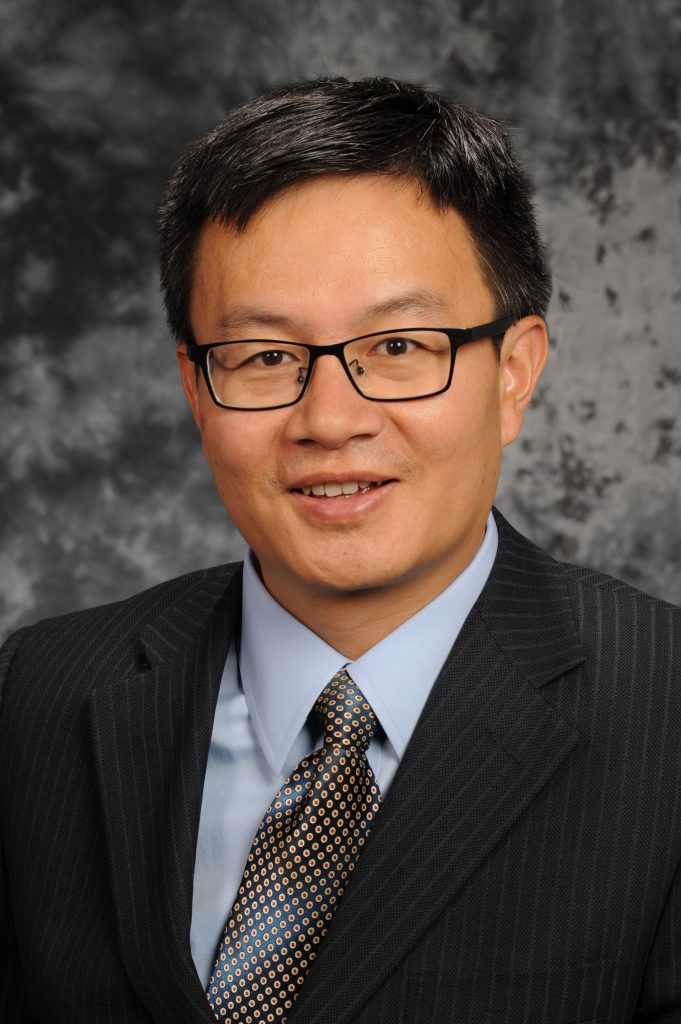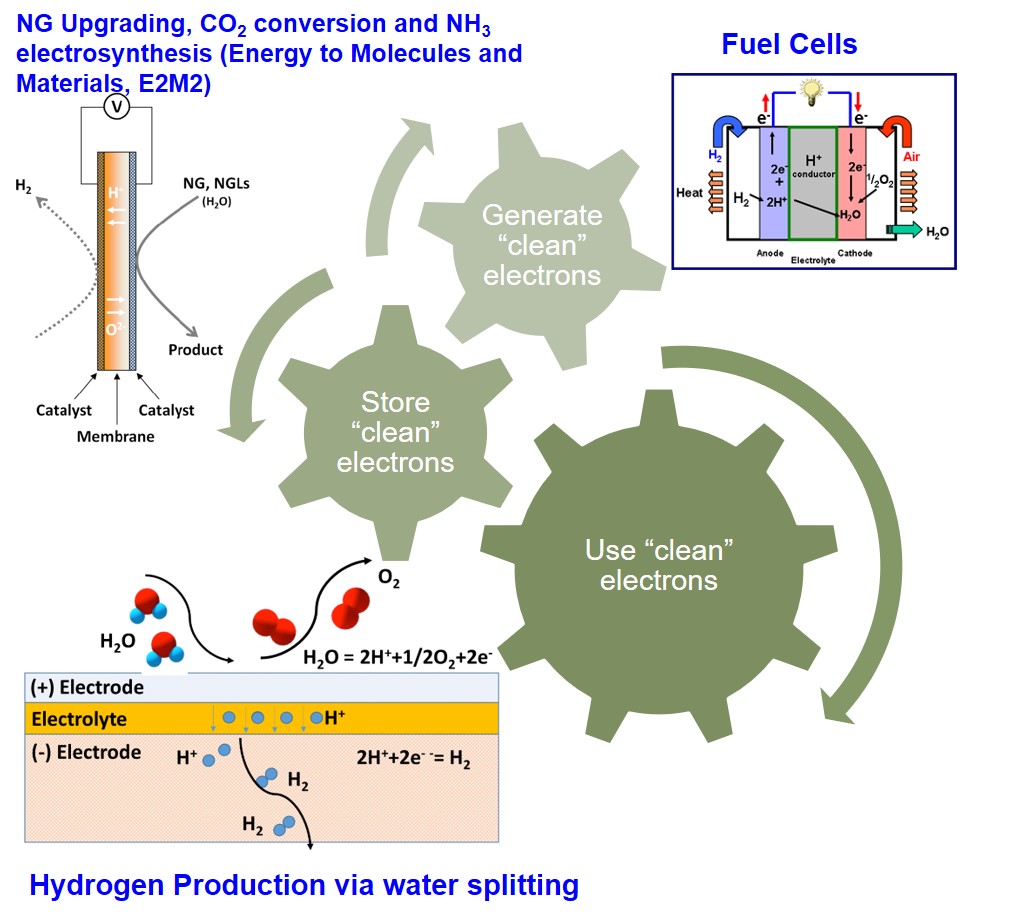Presented by Dr. Dong Ding on June 24
Dr. Dong Ding
“Electrochemical processing at intermediate temperatures (400-600°C)”
Senior Staff Engineer in Energy and Environment Science and Technology
Idaho National Laboratory
Date
Thursday, June 24, 2021
Time
1000h PT
Price
There is no cost to register for this event.
Pre-registration is required through ECS My Account.
Don’t have one? It’s easy to create–visit Create an Account now.
ECS membership is not required to participate.
Abstract
Widely available distributed feedstocks (e.g., steam, natural gas/natural gas liquids, CO2, and nitrogen) and the development of industrial electrification have opened numerous research opportunities for process-intensified production of fuels and chemicals, which could potentially address both environmental concerns and energy challenges. Electrochemical processing at intermediate temperatures through solid oxide cells/ceramic membrane reactors is a promising approach with the following advantages. It can circumvent disadvantages from low-temperature and high-temperature electrocatalysis, effectively overcoming the use of precious metal catalysts from the former and mitigating the fast degradation of the latter. Furthermore, modular units can be readily integrated with renewable energy or nuclear energy resources. When changing the operating potentials and temperatures, product selectivity can be controlled. Unfortunately, the primary limiting factors to broad commercialization of these technologies is their low efficiency and poor economic competitiveness. To address these challenges requires continuous innovation of materials/structure and fabrication processes—the precise objective of Dr. Ding’s team at Idaho National Laboratory (INL). Using their technical experience, capability, and scientific approach, they envision developing new processes via intermediate temperature electrochemical processes, which could be integrated with nuclear and renewable energy for a clean and secure energy future. Dr. Ding will provide several specific cases of electrochemical processing using solid oxide electrochemical cells.
Benefits of attending the webinar
- Become knowledgeable about emerging electrochemical technologies at intermediate temperatures, with a deep dive on hydrogen production, alkane activation, CO2 capture and conversion, and ammonia electrosynthesis using solid oxide electrochemical cells/ceramic membrane reactors.
- Know more about how scientific research and applied technology is connected based upon advanced performance-driven manufacturing processes that help to address the nation’s energy challenges.
- Gain insights into INL’s mission and role, and how the unique capabilities and expertise in the field of high temperature electrochemistry at INL can be leveraged by academia and industry.
Dr. Dong Ding
 Dr. Dong Ding is Senior Staff Engineer in Energy and Environment Science and Technology at the Idaho National Laboratory (INL). There he leads a group of more than 20 researchers in electrochemical processing and electrocatalysis for clean energy storage and conversion. He is a principal investigator for multiple projects funded directly and through the Laboratory Directed Research & Development Program. Ding is a technical lead for the HydroGEN Energy Materials Network and H2NEW programs of the Department of Energy’s Office of Energy Efficiency and Renewable Energy and Hydrogen and Fuel Cell Technology Office. His research focuses on INL’s two primary initiatives: Advanced Design and Manufacturing (ADM) and Integrated Energy Systems (IES), including natural gas upgrading, high temperature electrolysis, manufacturing of solid oxide cells/stacks, CO2 capture and conversion, ammonia electrosynthesis, fuel cells, and electrocatalysis.
Dr. Dong Ding is Senior Staff Engineer in Energy and Environment Science and Technology at the Idaho National Laboratory (INL). There he leads a group of more than 20 researchers in electrochemical processing and electrocatalysis for clean energy storage and conversion. He is a principal investigator for multiple projects funded directly and through the Laboratory Directed Research & Development Program. Ding is a technical lead for the HydroGEN Energy Materials Network and H2NEW programs of the Department of Energy’s Office of Energy Efficiency and Renewable Energy and Hydrogen and Fuel Cell Technology Office. His research focuses on INL’s two primary initiatives: Advanced Design and Manufacturing (ADM) and Integrated Energy Systems (IES), including natural gas upgrading, high temperature electrolysis, manufacturing of solid oxide cells/stacks, CO2 capture and conversion, ammonia electrosynthesis, fuel cells, and electrocatalysis.
Ding received his PhD in Material Science and Engineering at the University of Science & Technology of China, where he also completed a BS in Materials Chemistry. He was a Postdoctoral Fellow at the University of West Virginia and National Energy Technology Laboratory (2009-2010), and at the Georgia Institute of Technology (2010-2014). Before joining INL, Ding was Senior Materials Engineer at Redox Power Systems. Currently, he is an Institutional Fellow at the University of Louisiana at Lafayette, a graduate faculty member at the University of South Carolina, and an adjunct professor at New Mexico State University and the University of Idaho.
Ding served on the ECS High-Temperature Energy, Materials, & Processes Division executive committee, Journal of Power Sources Advances editorial board, and as guest editor for Frontiers in Materials and Frontiers in Chemistry. He received the 2020 Asian American Most Promising Engineer award and 2019 Federal Laboratory Consortium Far West Award in the category of Outstanding Technology Development. Ding has more than 110 peer-reviewed publications with an H-index of 38. He holds four U.S. patents and 15 patent applications.
ECS sections
ECS sections offer many opportunities for members to engage and expand their professional networks. Not a section member? Email customerservice@electrochem.org and ask to join your region’s ECS section.



